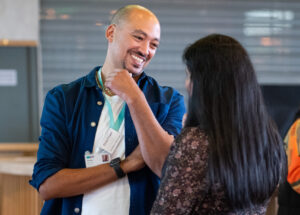Black History Month blog: “I can be my true authentic self”
In this powerful exchange, Simon Powell, Head of IT and Performance, and Sinéad Cregan, Director of Development and Innovation, write about their experiences of working together at Inspire North.

Simon Powell, Head of IT and Performance
Simon: When I was told that Sinéad was going to be my line manager, I thought ‘How is Sinéad going to support me as the Head of IT and Performance?’ I didn’t give any thought as to how Sinéad was going to support me as a black man, as unfortunately for the majority of my working life, experiences have conditioned me not to expect any support on race from my white colleagues. In addition to this, I was raised with being told that I would have to work ten times harder than any white person in an organisation if I want to do well or reach my goals.
From the few previous interactions I had with Sinéad, I knew I was going to get stimulating and thought-provoking conversation around racism and equality, diversity and inclusion, but I wasn’t expecting such a personal approach and interest in me… a black man in a heavily dominated white organisation. Sinéad took over line management of me at a time when I was still new in post, I didn’t have a team and it seemed like we had more pressure than I’ve ever known at Inspire North.
Since becoming Head of IT & Performance, I have had an imposter syndrome feeling, not because of my abilities to do my job, but more of ‘how is a guy like me in this post?’… to which when I say a guy like me, I mean a black man. I am confident in my role, my knowledge, and capabilities in delivering on my responsibilities but that doesn’t remove the fact that I have been raised, lived, and worked in a society that has a long and continued history of oppressing people who look like me, keep us at the back of the bus, without a seat at the table, and in some cases, not even invited into the room.
Because of this, it is sometimes hard to shift the feeling of not belonging in particular setting, organisation, job role etc. This feeling, topped with not having a team and what I can only describe as crazy pressures really got me quite stressed and feeling down, which was becoming noticeable by colleagues and my family. I am not sure Sinéad actually knows how much of an impact she has had on me or my feeling of imposter syndrome. We have had many deep conversations that have allowed me to not only be my authentic self but speak my truth. Sinéad invested time and interest in me that genuinely gave me a feeling of ‘this person has my back and wants me to do well’.
From a professional point of view, the guidance and support that I received enabled me to take more control of my role and department, but from a human point of view, I have been able to build on my emotional intelligence, explore deep rooted feelings, and express my concerns and fears. Like most parents, I love to talk about my children and share all of the crazy antics that they get up to, which can be quite comical, but with Sinéad I have found myself sharing more of the challenges and heart-breaking situations that have occurred. Like the time my 8 year old daughter was listening to the news about the uproar around Ariel from the Little Mermaid been played by a black girl, to which my daughter then asked me “daddy, would they be mad if I wanted to be the Ariel?” Which from what she was seeing on the news, I could only say yes. When I told Sinéad this story, I could feel the emotion from Sinéad simply by the look on her face, which may sound a little strange, but it actually warmed me as I didn’t get the usual ‘oh, that’s terrible’. The look told me that Sinéad could hear me loud and clear, and that she acknowledged the hurt I was feeling.
I am continuing to do well in my role and see my department as an integral part of our organisation. I am not doing anything different within my role, but my feeling and sense of belonging has never been as high, and I feel like I can be my true authentic self.
Thank you Sinéad.

Sinéad Cregan, Director of Development and Innovation
Sinéad: When it was agreed that I would temporarily assume line management of Simon my first thoughts were, ‘How do I support Simon as a black man and our Head of IT and Performance?’ I was so aware of me being a white woman in a Director’s role, but I knew I would also be a powerful ally for Simon. My lack of knowledge around our IT and Performance came second as I knew I would be able to pick that up quickly from Simon. I just wanted to understand from him how he felt in his role and to ensure he was afforded the support he needed as a black man in this role.
Simon and I had previously had conversations about race and racism, but this relationship allowed for us to have much deeper conversations that I know have changed both of us. And yes, at times it has been emotional for us both! We are both people that are not shy of sharing our emotions regardless of the dynamic of the working relationship that we had entered into. Simon and I have had conversations about the impact of racism on him and how he has developed professionally. Like many black men Simon feels he has to prove himself so much more than his white counterparts and that he has to be the best and is driven by this.
We have spoken about his ten-year-old daughter starting to feel the impact of race and how Simon is having to have conversations with his three daughters in the car when driving them to school. We have talked about heritage and in particular the age-old tradition of children having their hair combed and greased whilst sat between their parents legs and the chats that took place. Simon is a proud dad: he does his daughter’s hair but could he bring that into a conversation with colleagues? I hope he does.
So from my perspective I have enjoyed having the opportunity to work with Simon and to have these conversations. Now someone might say how is that relevant to supervision? But it is crucial to me, as it allows for Simon to be his authentic self, it maintains his well-being and he knows it is a safe space. Simon now has a mentor who is also a black man and I know this really has meant a lot to him as he has someone that really understands him and who can relate to him.
As we come to the end of another Black History month let’s think about our approach and how we ensure that we create an environment whereby people of colour can be their true authentic selves and thrive.
Thank you Simon.
